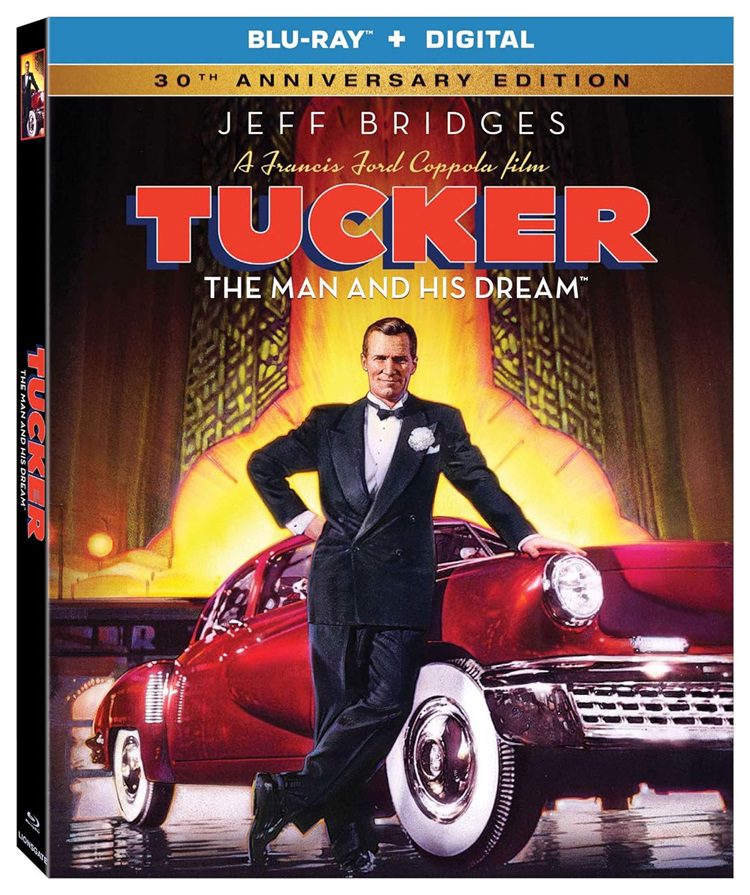
Under the hands of a lesser director, the story of a man obsessed with bringing out the car of his dreams in the 1940s, could have been quite a self-absorbed mess. With Francis Ford Coppola at the helm, Tucker: The Man and His Dream turned into an inspiring and fascinating bio-pic. The 1988 movie has a 30th Anniversary release from Lionsgate on Blu-ray that brings the oft-forgotten film back for deserved recognition.
The year 1988 was not great for film releases. The comedy was broad and the drama and action often revolved around war like Rambo III or Die Hard. By this point, Francis was an older director who had his best pictures in the 1970s. This was not going to be The Godfather or Apocalypse Now. The musings of a more mature director was exactly what this film needed not to seem dated. The first thing that this true story hits you with is character. Jeff Bridges is a dreamer more than anything else. The newsreel-style film at the beginning makes it clear that while this is the story of the creation of a car – it’s really about the dreams of Tucker. His vision for the new, revolutionary style of car is symbolic of the world coming out of World War II but it’s also a message that resonates with audiences in the malaise of the end of the 1980s and still today.
The car and the story of the car are interesting in itself. And Coppola doesn’t let us down. There’s the fascinating process of watching the car grow from his vision to paper to the building of the actual car. The journey is full of twists and turns as things work and don’t work. I love the “reveal” of the car to the press and they are working on it behind the scenes as Tucker is stalling for time. The car catching on fire as they are about to roll it out is symbolic of the firestorm they are creating with the beautiful car.
The story has the undercurrent of rebelling against authority. Tucker, like Howard Hughes (another fun cameo in the pic), chose to work outside of the established industry. He reminds me of a current day Elon Musk – people saying he can’t do what he promises to do, him dreaming of a revolutionary future, and the Big Three automakers doing whatever they could to put a stop to him. This side of the film is depressing in some ways but Coppola plays it mostly as it happened. Detroit was not in the mood post-war for American competition as they recovered their industry.
The main themes of “The Dreamer” and his Dream are well acted by Jeff Bridges. Multiple viewings show that Bridges is the catalyst but it’s how he affects the people in his life. I’m drawn to the Martin Landau character, Abe Karatz, who says he first started to help Tucker just to make money but along the way bought into the Dream. Joan Allen as Tucker’s wife is another person who changes her life to be a part of his dream. I wanted to get more of her from the beginning but her scene with the Board of Directors shows that she was just as ruthless in getting the funding for the car to be made. Even a young Christian Slater as Tucker’s son gives a solid performance as the college-bound student who gives up everything to help his father.
All three stories come together in the courtroom scene at the end. Coppola knows how to tie together all the loose ends at the end of a story. And that’s not just the main story but all the emotional beats are rewarded in the trial. This is the American Dream – a talented person working outside the established system to improve and existing product. This was Coppola and his generation of filmmakers in the 1970s. This is the story of the 1940s, 1980s and 2010s. It’s a consistent theme across generations.
The only drawback is the Dreamer himself. We don’t get much of the inner workings of Tucker. Part of that is the need to hit the ground running with the story of the car. Part of it is that it would probably add another 45 minutes to the film. Tucker the car is an easy to grasp story. Tucker the man is more interesting but complicated if you delve too deep. I see that Coppola keeps the story surface to make Tucker more relatable. And it is still a film that holds up in 2018.
The Blu-ray has a new introduction by Coppola, an interesting commentary by him, a deleted scene, a Making Of, and a 1948 Promo film about the car. It’s a great set of extras for this film that’s not often celebrated. In a year with few memorable films that have survived to be lauded 30 years later – this one still deserves attention.